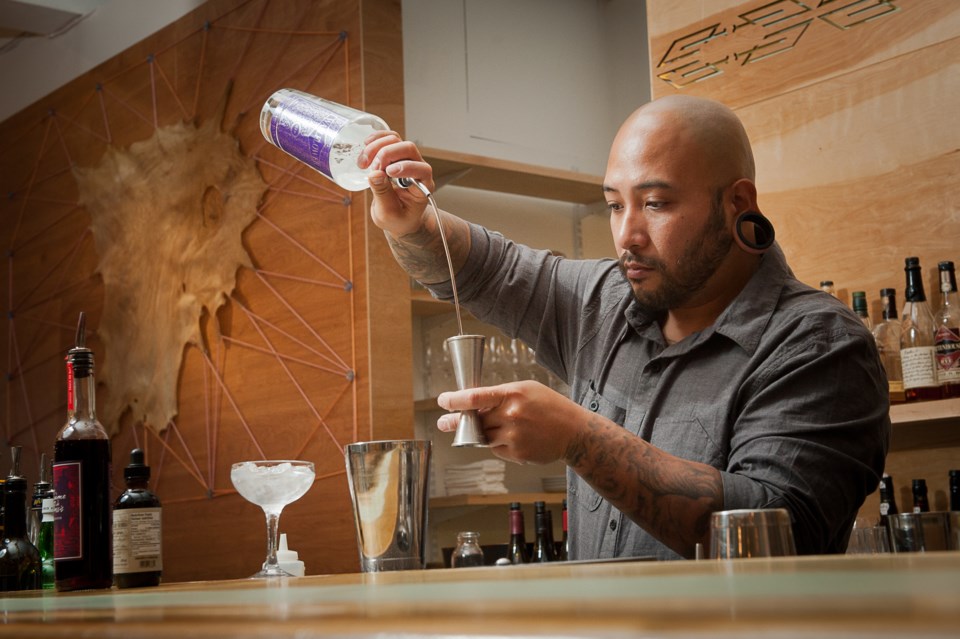For something that seems to have been around since the dawn of civilization, spirits are a surprisingly new industry to British Columbia and, in fact, Canada. Two of the oldest craft distilleries in the country (both located in BC), Okanagan Spirits and Maple Leaf Spirits, both have been producing award-winning vodka, gin, fruit liqueurs and even absinthe for just over a decade.
In the Lower Mainland, the real boom in terms of awareness began less than two years ago.
“I’ve always kept an eye what’s been happening locally, but it was just over a year ago when I really started to see the uptick in local spirits, especially from places like Odd Society, Long Table and Liberty,” says Peter Van de Reep, bar manager at Campagnolo Upstairs.
Media attention has certainly been a recent phenomenon, as Liberty Distillery was established in 2010. Since then, the number of craft distilleries in BC has more than doubled, with approximately 25 micro-distilleries now operating in the province, and more slated to open within the next two years.
That change can likely be tied into the BC government’s relaxing of liquor laws back in 2013, which allowed local distilleries and breweries to have on-site tasting rooms or lounges, as well as sell their products directly to the public if they were made from 100 per cent BC agricultural ingredients.
Why was this important? Distillers could avoid the fat 163 per cent mark-up charged by the BCLDB to sell spirits at their retail locations, and keep a little more money in their own pockets, meaning making a living by producing artisan spirits became just a little more viable.
In case you’re confused by terms like “artisan,” “micro-distillery,” and “craft distillery,” here’s a breakdown:
“Artisan” is a generic, non-licensed term that tends to refer to anyone who produces food or drink in a non-mechanized or traditional way using high-quality ingredients.
“Micro-distillery” refers to a “boutique” operation that produces relatively small batches of spirits.
“Craft distillery” in BC is a government-generated designation, meaning a distillery that produces less than 50,000 litres per year, uses 100 per cent BC agricultural goods, and distills on site.
Most of the micro-distilleries in BC have the craft designation, but a small handful do not, notable among them Long Table and Victoria Spirits. Both produce excellent hand-crafted spirits, but sourcing some of their botanicals from ethical global sources, as is the case with Long Table, means they’re just shy of hitting that 100 per cent made-in-BC mark.
Regardless, the plethora of locally-produced hooch is a boon for bartenders who care about the quality and provenance of their spirits.
“I’m a big fan of Odd Society, love their products, love the people,” says Van de Reep as an example. “They’re producing a line of spirits that are very appealing to a bartender.”
Odd Society’s East Van Vodka has become a staple at several notable bars, as has their Wallflower Gin and their popular Crème de Cassis. Nor are they the only popular local producer. Ampersand Distilling from Duncan has become famous for their gin, as has Urban Distilleries for their Spirit Bear line of vodka and gin, as well as BC’s first single-malt whiskey. Dubh Glass Distillery’s Noteworthy Gin, made from “dark water” sourced via a well on their property in Oliver and originating from glacial peaks, is another standout for its distinctive floral notes. Gillespie’s Gastown Shine Vodka from Squamish has become a local darling with both consumers and bartenders. The list goes on, as Arthur Wynne, head bartender at Blacktail, notes.
“People love [the local products],” he said. “When you’re running a restaurant, especially in an area with a lot of tourists, you want to be able to promote what’s locally made, and people do ask for that. They feel good when they know they’re drinking something that was made right in their own backyard.”
Nor are traditional vodkas and gins the only spirits on offer.
“Victoria Spirits is making a hemp vodka,” enthuses Van de Reep. “Okanagan Spirits has one of the most diverse lines, with their eau de vies and their absinthe.”
Pemberton Distillery, a field-to-glass operation, also makes absinthe, as well as brandies and liqueurs. Long Table produces a highly sought-after aquavit, while Maple Leaf Spirits is famous for their fruit brandies sourced from Okanagan orchards. Wayward Distillery in the Comox Valley uses honey as the base for all of their spirits.
Now in its second year, BC Distilled is once again bringing together BC’s micro-distilleries on April 18 to let both industry professionals and the public see and taste the local spirited offerings. Last year’s show introduced previously unknown producers and those whose products were still in the testing stages. This year, the event promises to be a great learning experience, as the distillers and owners are often on site with their products.
“I founded BC Distilled because I firmly believe that one of the biggest challenges the industry is facing is general awareness with consumers,” says organizer Alex Hamer. “By bringing the majority of distillers in the province together for this tasting event, it brings a greater attention to the industry than any one distillery could do on its own. All of the producers benefit from this attention.”
Despite the fact that the number of micro-distilleries have almost doubled in the last year, Hamer believes there is still plenty of room for growth.
“We have to assume there is a ceiling on the number of micro distilleries in the province, but I don’t think we’re there yet,” Hamer says. “Washington State, with it’s population of 7 million, has 80 distilleries, with another 40 pending. BC has a smaller population and we likely won’t follow that exact pattern, but it shows us there is still room to grow.
“Personally I wouldn’t be surprised to see BC supporting 40-50 distilleries. We have the demand for it: consider BC Liquor’s $370 million in domestic spirit sales last year.”
As the only event focusing exclusively on BC spirits, BC Distilled provides the best opportunity to see the quality and variety of products local distillers are bringing to the market.
“Most local micro-distilleries are mom-and-pop operations,” explains Van de Reep. “The whole operation might have one to four employees total, including the owner/distiller, so it’s a great opportunity to meet the makers and learn first-hand about their operations and products.”
With 11 new distillers joining the ranks this year, the line-up promises to be an exciting one. Close to 100 individual spirits will be presented, as well as non-alcoholic producers like Walter All-Natural Craft Caesar Mix, SIP Soda, Bittered Sling Extracts, Dickie’s Ginger, and food from Forage Restaurant and the Donnelly Group.
Changes in provincial liquor regulations and the event’s partnership with Legacy Liquor means BC Distilled will be offering retail sales on site for the first time ever.
“It’s really a one-stop shop,” enthuses Van de Reep. “Even as a bartender or buyer, I can go in and try 60 to 70 spirits in one go, and decide for myself.”
BC Distilled
BC Distilled takes place April 18 at the CBC Studios at 700 Hamilton. Two public tastings are offered between 4pm-6pm and 7pm-9:30pm. Tickets are $49.99 each, with proceeds benefitting the BC Hospitality Foundation.




